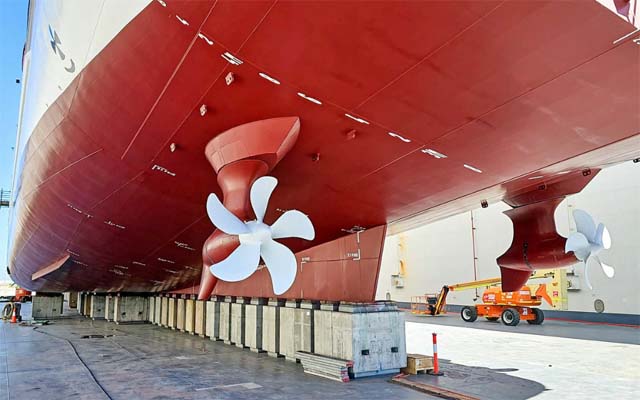Graphene-based coatings manufacturer GIT Coatings and Australian cruise line Coral Expeditions have entered into an agreement to use a combination of robotic hull grooming and graphene-based hard foul release coatings on the passenger vessel ‘Coral Adventurer’, marking a first for the global cruise industry.
In April 2024, the Coral Expeditions’ 120-passenger ship, Coral Adventurer, was initially coated with GIT’s graphene-based hard foul release coating. Its hull was coated with XGIT-Fuel and its propellers with XGIT-Prop. XGIT-Fuel is a graphene-based hard foul release hull coating that creates an ultra-low friction surface to increase vessel efficiency, and its patented XGIT technology secures a hydrated layer that deters the settlement and attachment of biofouling. It was also recently adopted by leading Finnish shipping passenger operator, Finnlines across its ro-ro and ro-pax fleets.
XGIT-Prop is a highly durable graphene-based hard foul release propeller coating that helps to improve vessel performance by keeping the propeller smooth over time. It is seen as an efficient and simple way to improve CII ratings. In March 2024, dry bulk company Pacific Basin adopted the coating across its fleet.
The coating is said to offer an extended lifespan leading to reduced maintenance intervals and consistent performance throughout prolonged operational periods due to its low friction surface out of dock. The biocide-free sustainable foul release technology does not leach any toxins such as copper and silicone-oils into the ocean, as well as the reduction of carbon emissions omitted to air due to the low friction provided by the mechanical makeup of the performance paint.
Coral Expeditions MD Mark Fifield said: “These advancements exemplify Coral Expeditions’ dedication to pioneering sustainable practices within the expedition cruising sector. Coral Adventurer is leading the charge towards a brighter future for marine technology.”
Coral Expeditions was looking to use a biocide-free coating, paired with a grooming solution, to keep the hull free of fouling over time while adhering to biofouling regulations. Implementing this process resulted in the vessel spending less time in dry dock, ensuring it remained on schedule for cruise passengers. Working in collaboration, GIT and Coral Expeditions curated a grooming schedule that was easy to maintain and aligned with the company’s operations.
GIT Coatings CEO Mo AlGermozi said: “This represents the future of marine coatings. We are pioneering a shift towards more sustainable operations, eliminating toxic biocides and silicone oils, while maintaining peak performance. Additionally, we are overcoming the durability limitations of traditional silicone technologies. Our partnership with Coral Expeditions will showcase the transformative potential of the real sustainable coatings industry.”
The Australian Hull Biofouling Management Regulation, which is now in effect, has established new requirements for managing biofouling on international vessels arriving in Australia. Operators of all vessels subject to biosecurity control will be required to provide information on how biofouling has been proactively managed prior to arriving in Australian territorial seas, aiming to minimise the transfer of invasive species via ship hulls.
As the project marks three months since the refloat and application of the hard coating, Coral Expeditions has confirmed that it will be proceeding with a grooming robot to keep the vessel clean.
Image: GIT Coatings’ graphene based products have been applied o cuise ship ‘Coral Adventurer’ (source: GIT Coatings)



